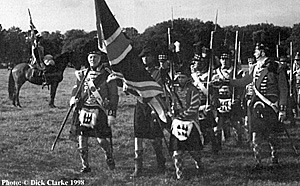The Black Watch
Fight at Corunna
1808
James Gay, 42nd Royal Highland Regiment (NA)
Photo © Dick Clarke 1998
| |
The slender and shambolic Spanish army was puffed out of existence. And at the appointed rendezvous where they had expected to meet their allies the British force of 40,000 met with the dragoons and outlying skirmishers of a much bigger French army. The only hope was to try to evacuate as much of the British army as possible before it was annihilated. So on Christmas Eve Sir John Moor about-turned his columns westwards, and headed for his sea-base at Corunna, 250 miles away in the north-west corner of Spain across wild mid-winter mountains. It was a desperate retreat. Black skies impended. Bitter tempests whipped the trudging troops. They were gnawed by hunger shaken with the ague, bare-foot and ragged. French dragoons hovered and harried around the fringes of the column. Discipline collapsed. Arms were thrown away. Soldiers shambled arm in arm, like drunks.
The Black Watch were in the rear-guard, and beat off the advance parties of French in a number of successful, skin-of-the-teeth actions. The British army did not lose a gun or a flag on its long retreat. The Kilt stood up to the savage weather better than other uniforms and the Black Watch made themselves Highland shoes out of hides of dead horses. The retreat went on for 18 days, and 4,000 British died of exposure on it. When the survivors limped into Corunna, pipes playing past the General, the Regiments with fewest stragglers were the Black Watch and two other kilted Regiments.
At Corunna in January 1809, the British army turned at bay to cover its embarkation. The hammer-blow of the French again fell on the Brigade of which The Royal Highlanders were part. Sir John Moore called out to them as the French attack started to come in: 'Highlanders, Remember Egypt'. Some accounts of the battle say that a Regiment of Footguards was coming to relieve them, and the General is said to have shouted out again: 'My brave 42nd join your comrades. Ammunition is coming and you have your bayonets'. The companies turned and closed again on the enemy with their bayonets. But there is considerable controversy about this episode and it was emphatically denied after the battle by the Commanding Officer of the Black Watch. In any case it is always slightly curious how these heroic quotations from Generals were ever heard in the din of battle.
Perhaps more authentic, a private of 42nd Black Watch wrote his worm's eye-witness narrative of Corunna after the battle - 'The Commanding Officer said "42nd Charge" in one moment every man was up with cheer and the sound of musket and every shot did execution. They were so close upon us that we gave them the bayonet the instant we fired. The confusion that now ensued baffles all my powers, even of memory and imagination - pell-mell, ding-dong - ilka man gat hid birdie (sic.), and many of us skivered pairs, front and rear ranks; to the right about they went, and we after them. I think I see the grizzly fellows now running and jumping as the 42nd Highlanders laughing and swearing and foaming, stuck the pointed steel into their loins. We followed them down the valley, and stopped not for General or Commanding Officer, but still on, in the rage and wrath of Highlanders.
The Commanding Officer of an English Regiment at Corunna wrote in one memory that when the battle started he had received no order, and was in quandary. He saw the Black Watch advancing and shouted to one of his Officers. 'Good God, Montgomery, are we not to advance?' Montgomery, a Scot replied: 'I would not wait. You cannot be wrong to follow the 42nd'
The battle was a brilliant success against heavy odds. But Sir John Moore was shattered by cannon shot while watching the Black Watch advance. He was helped behind a wall by one of the 42nd Highlanders and later carried off the field by four Highlander and two Guardsmen -shedding tears all the way. He died that night. Moore who shook the cobwebs of a century off out-of-date British military tactics was a great admirer of the Black Watch he said that their toughness made them able to stand fatigue under which other apparently stronger men would sink. He also said that their courage was sure and not just a flash in the pan.
The evacuation went without a hitch now, and the Black Watch arrived in Kent, tattered and riddled with typhus having suffered 212 casualties at Corunna.
So the 42nd returned to Edinburgh to recuperate it was still under strength when it returned to Portugal to join Wellingtons army in the Peninsular campaign.
|
 In 1808 British armies marched into Spain from three directions to meet at Salamanca on the road to Madrid. The Black Watch came up from the south in the pincer from Gibraltar. The idea was to join with the Spaniards to defeat Napoleon's huge army of occupation in Spain. It didn't work. Madrid fell nerveless to French in a day.
In 1808 British armies marched into Spain from three directions to meet at Salamanca on the road to Madrid. The Black Watch came up from the south in the pincer from Gibraltar. The idea was to join with the Spaniards to defeat Napoleon's huge army of occupation in Spain. It didn't work. Madrid fell nerveless to French in a day.